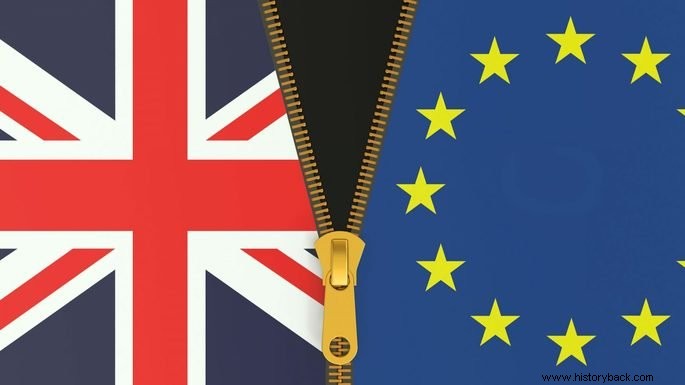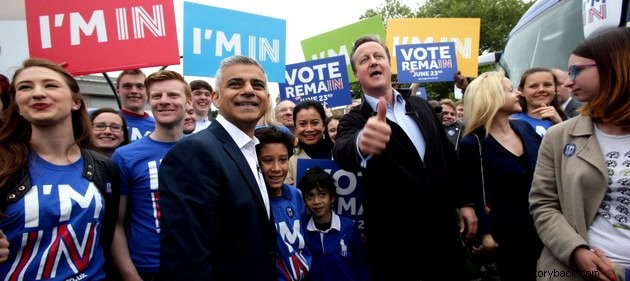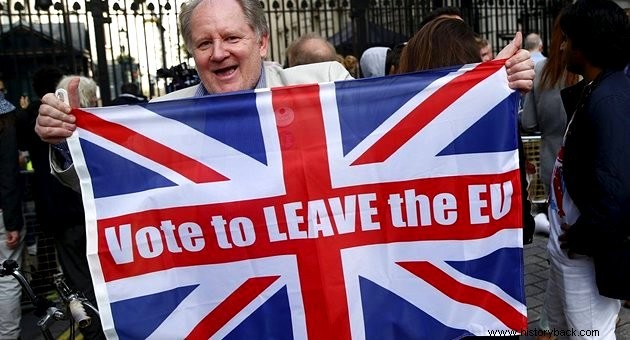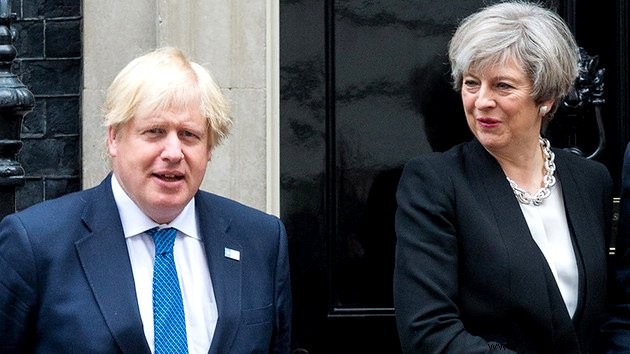Brexit is the process of leaving the United Kingdom from the European Union started in 2017 and scheduled to end on December 31, 2020.
On January 31, 2020, the UK left the EU, becoming the first country to do so.
After this date, there was a period of eleven months for various treaties and agreements to be negotiated between the United Kingdom and the European Union.
Due to the coronavirus pandemic, negotiations were affected and Prime Minister Boris Johnson wanted to withdraw from the European Union without an agreement.
However, on December 24, 2020, the United Kingdom and the European Union managed to sign a treaty guaranteeing that the markets of both would remain open.
Meaning of Brexit
The word Brexit comes from the junction of the English words “Britain ” (Brittany) and “Exit ” (output).

The expression is used to characterize the process of withdrawing the United Kingdom from the European Union, which began with the referendum of June 23, 2016. On this date, the British chose to leave the European economic and political bloc.
The United Kingdom's departure from the European Union
2019 was the most complicated year, as the differences between British politicians became more evident, as the plan to leave the European Union needed to be approved by the British Parliament.
On the other hand, the British Parliament guaranteed on March 13, 2019, that the United Kingdom would not leave without a deal. This was a proposal championed by many members of Theresa May's own party.
However, on 12 March 2019 and later on the 25th of the same month, the British Parliament rejected the plan put forward by then Prime Minister Theresa May to withdraw from the European Union.
Without reaching consensus in Parliament, Theresa May had to ask the European Union for a new extension. Thus, the expected date of departure from the United Kingdom would be October 31, 2019.
With her position weakened, May resigned from her post. British law did not provide for the calling of new elections, but a replacement within the party chosen by Boris Johnson.
Boris Johnson and Brexit
The new British Prime Minister, Boris Johnson, is a well-known advocate of a "hard Brexit", that is:withdrawing the United Kingdom from the European Union without making any kind of agreement.
In order to pressure MPs, Johnson asked Queen Elizabeth II to postpone the official opening of Parliament, which takes place in September, to October 14. The proposal was accepted by the sovereign and thousands protested in the streets against the "closing" of the British parliament, but the prime minister did not back down.
Boris Johnson's objective was to prevent the articulation of the opposition.
However, the first debates held by the prime minister in Parliament turned out to be a failure. The Conservative Party lost one of its deputies and another 21 parliamentarians were suspended for indiscipline.
Furthermore, Parliament has once again rejected the no-deal Brexit project.
In order to gain more support for his idea, Boris Johnson dissolved Parliament and called for new general elections. The result was a landslide victory for the Conservatives who won an absolute majority of MPs and thus were able to proceed with the Brexit negotiations.
Approval of the Brexit deal
After intense negotiations with the 27 countries of the European Union, the United Kingdom reached an agreement to leave this economic bloc on October 16, 2019.
This time, the free movement of people and goods between the borders of the Republic of Ireland and Northern Ireland is guaranteed. However, the new agreement provides for the end of special status for the UK and makes it an economic rival.
The bill passed the British Parliament the same month. However, parliamentarians did not refuse to debate the text in just two days and forced the prime minister to ask the European Union for a three-month postponement.
As a consequence, Johnson had to agree and this time the date for Brexit will be January 31, 2020.
Background of Brexit
The European Union (EU) was created with the aim of maintaining peace between the countries of the European continent.
The embryo was the European Coal and Steel Community (ECSC), created in 1952. The ECSC united the former adversaries of the Second World War:France, Germany, Italy, Belgium, the Netherlands and Luxembourg.
This community was later expanded in a movement that created the European Economic Community (EEC) in 1957.

The United Kingdom, however, always remained outside the EEC and only accepted to be part of the club in 1973. Even so, two years later, they called a referendum for the population to decide whether or not to continue. At that time, he won the “yes”.
In this way, the UK continued to be part of the EU, but did not participate in the two biggest European projects:
- the creation of a single currency, the euro;
- the Schengen Area, which allows the free movement of people.
Referendum on Brexit
The Brexit campaign stems from the government of Conservative Prime Minister David Cameron.
To run for re-election, Cameron allied with the nationalist party, the UK Independence Party (UKIP).
In exchange for its support, this party demanded the convening of a referendum, where voters could choose between following or leaving the European Union.
UKIP argued that the European Union was stripping the United Kingdom of sovereignty in economic and immigration matters. For this reason, he asked that a consultation be carried out with the population about remaining in this economic bloc.
The referendum was scheduled for June 23, 2016:48.1% voted no to leaving the EU, but 51.9% voted yes.
See also:Refugee Crisis in Brazil and in the WorldConsequences of Brexit

The consequences of Brexit are difficult to predict, as it is an unprecedented process. For now, we observe political impacts, such as:
- The Ministry of Departure from the European Union was created in the United Kingdom, employing at least 300 people to deal exclusively with the matter;
- David Cameron resigned as prime minister and after internal discussions in the Conservative Party, was replaced by Theresa May, who assured that he would not go back on the Brexit process;
- Faced with deadlocks to reach an agreement, Prime Minister Theresa May resigned from her post and saw her biggest opponent, Boris Johnson, be sworn in as prime minister.
Economic consequences for the UK
- The day after the referendum, the pound sterling fell sharply, as did the Australian dollar and the New Zealand dollar;
- the stock market and the securities market suffered a sharp drop that week. Therefore, the British government lowered interest rates and made bank loans to stem a possible loss of capital;
- the pound sterling has lost value against the dollar and the euro;
- several companies have already moved their headquarters to countries like Holland and France.
Economic consequences of Brexit for the European Union
- Loses UK monetary contribution;
- will have to renegotiate all trade treaties with the UK;
- fear that Brexit will inspire other countries to do the same;
- concern about the situation in Northern Ireland, which is part of the EU but shares borders with the United Kingdom.
Calendar for Brexit
Article 50 of the Lisbon Treaty stipulates that the negotiation may last for 2 years. Initially, the process was supposed to be completed in March 2019.
In December 2017, British Prime Minister Theresa May agreed to pay €45 billion to leave the European Union.
In March 2018 it was announced that there will be a two-year transition period when the UK leaves the European Union for good in 2019.
On November 24, the 27 countries of the European Union agreed to terms of departure made by Great Britain. This must be ratified by the British Parliament.
Thus, the UK would officially leave the European Union on March 29, 2019, but the process was postponed to April 12, 2019.
Without Parliament's approval, Brexit was again set for January 31, 2020, with a one-year adjustment period.
See also:Economic BlocsNegotiations for Brexit
Negotiations between the United Kingdom and the European Union are happening little by little. The proposals that caused the most controversy concerned the customs model and the Irish border.
Let's see how this impasse was resolved:
Customs Template
Initially, it was intended to make a free trade zone between the UK and the EU. This plan, however, was rejected by the most radical supporters of Brexit who claim that it would not bring back sovereignty to the United Kingdom.
Thus, the United Kingdom will not have any privilege when trading with the European bloc and will receive the same treatment as other countries in the world.
Northern Ireland
Northern Ireland borders the Republic of Ireland, which is a member of the European Union. With Brexit, the two countries would again have checkpoints, which would hinder the movement of people and goods.
In October 2019, Boris Johnson presented a proposal that pleased the European bloc. This territory will form part of the United Kingdom Customs Union, but must respect the rules of the European Common Market.
British Government Disagreements Over Brexit
The clashes between supporters of a total break with the European Union and an amicable divorce, as Theresa May wanted, exposed the existing differences in the British government.

On 8 July 2018, after a weekend of tense negotiations, the minister responsible for Brexit, David Davis, resigned after disagreeing on maintaining the customs union between the UK and the EU after Brexit.
Two days later, it was the turn of the then Minister of Foreign Affairs, Boris Johnson, to resign from his position for the same reason. Boris Johnson was one of the main critics of May's policy.
British Government Proposal for Brexit
On July 12, 2018, the British government presented its proposal to leave the European Union. The document suggests the formation of a free trade zone for goods with the European Union. Furthermore, it proposes:
- Customs tax control and its trade policy;
- The approval by the British Parliament of European laws and regulations that were to come into force in the United Kingdom;
- Free movement of people would be abolished, but new legislation would be created for those seeking work or wishing to study in the UK.
On November 14, 2018, Theresa May presented the proposal to the British Parliament that contemplates her Brexit ideas. For disagreeing with the terms of the document, the minister for Brexit, Dominic Raab, resigned from the government.
Some points of this agreement are:
European Citizens
Anyone who is a national of a European Union country and entered the United Kingdom before March 29, 2019 will be able to remain in the country with all their rights respected.
Likewise, the United Kingdom is committed to respecting those who take up residence there during the transition period.
For their part, the British will lose the right to move freely and take up residence in the countries of the European Union.
Budget
The United Kingdom will continue to contribute contributions until the year 2020 to the European budget. However, for the five-year period 2021-2027, the British are no longer expected to make any further economic contributions.
They will continue to pay the expenses and pensions of British employees in the EU, something that is expected to last until 2064.
Gibraltar
Great Britain has a territory that borders Spain:Gibraltar. Pressured by Spain, the European Union guaranteed that any change in the Gibraltarian statute will have to have Spanish approval.
This idea was rejected three times by the British Parliament.
Brexit:yes or no?
Former Prime Minister Theresa May categorically reaffirmed that the government did not contemplate the possibility of Brexit not happening. Likewise, she reiterated that there would not be another referendum on this issue.
The Court of Justice of the European Union ruled on 9 December 2018 that the United Kingdom could leave the European Union without an agreement with the 27 European partners.
Again, British MPs voted on Brexit on March 12 and 29, 2019 and, once again, Theresa May's proposal was rejected. Faced with this defeat, May resigned.
In the streets, supporters of both the exit and the permanence organize demonstrations in order to put pressure on the government.
Learn more about some related topics :
- Treaty of Maastricht
- Globalization
- Updates that may fall into the Enem and Vestibular exams
- Geography Enem:subjects that fall the most
